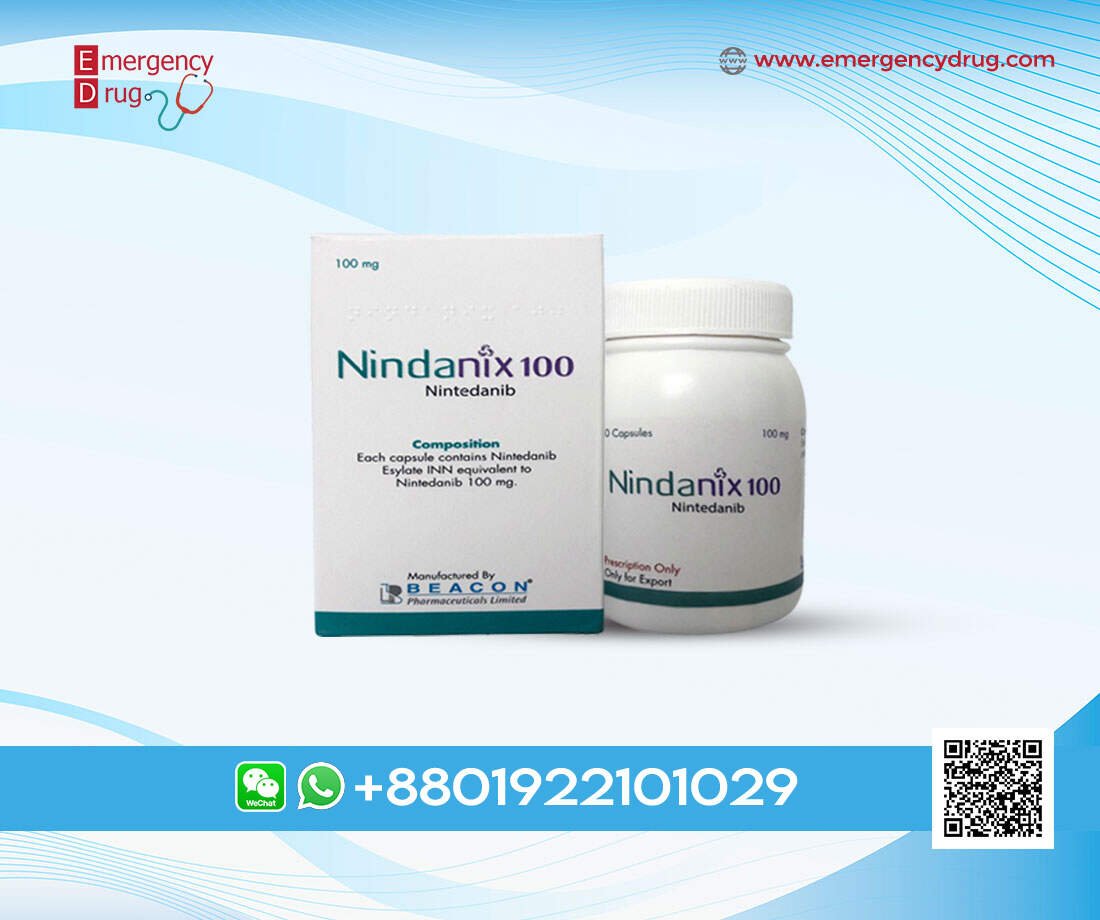
Ventoxen (venetoclax) 100 MG – 60 Tablets
Price: $260.00
Product Feature:
| Manufacturer | : Everest Pharma Ltd |
| Indication | : Chronic lymphocytic leukemia |
| Strength | : 100 mg |
| Quantity | : 60 Tablets |
| Storage | : Below 30°C |
| Registrations | : Export Only |


Description
Venetoxen is use alone or in combination with obinutuzumab (Gazyva) or rituximab (Rituxan) to treat certain types of chronic lymphocytic leukemia (CLL; a type of cancer that begins in the white blood cells) or certain types of small lymphocytic lymphoma (SLL; a type of cancer that begins mostly in the lymph nodes). This is also use in combination with either azacitidine (Vidaza), decitabine (Dacogen), or cytarabine as a first treatment for acute myeloid leukemia (AML; a type of cancer that begins in the white blood cells) in people 75 years of age or older, or in adults who have medical conditions that prevents them from treat with other chemotherapy medications. Ventoxen is in a class of medications called B-cell lymphoma-2 (BCL-2) inhibitors. It blocks the action of a certain protein in the body that helps cancer cells survive. This helps to kill cancer cells.
Using this medicine
Venetoclax comes as a tablet to take by mouth. It is usually taken with a meal and water once a day. Take venetoclax at around the same time every day. Follow the directions on your prescription label carefully, and ask your doctor or pharmacist to explain any part you do not understand. Take ventoxen exactly as directed. Do not take more or less of it or take it more often than prescribed by your doctor.
Swallow the tablets whole; do not split, chew, or crush them.
If you vomit after taking venetoclax, do not repeat the dose. Continue your regular dosing schedule.
Your doctor will probably start you on a low dose of venetoclax and gradually increase your dose, not more than once every week for the first 5 weeks if you are being treated for CLL or SLL, and once a day for the first 3 or 4 days if you are being treated for AML.
Your doctor may need to interrupt or stop your treatment if you experience certain side effects. Be sure to tell your doctor how you are feeling during your treatment with venetoclax. For certain side effects, your doctor may tell you to start taking ventoxen at a lower dose.
Your doctor or pharmacist will give you the manufacturer’s patient information sheet (Medication Guide) when you begin treatment with venetoclax and each time you refill your prescription. Read the information carefully and ask your doctor or pharmacist if you have any questions.
How Ventoxen Works:
There are different types of targeted therapies, defined in three broad categories. Some targeted therapies focus on the internal components and function of the cancer cell. The targeted therapies use small molecules that can get into the cell and disrupt the function of the cells, causing them to die. There are several types of targeted therapy that focus on the inner parts of the cells. Other targeted therapies target receptors that are on the outside of the cell. Therapies that target receptors are also known as monoclonal antibodies. Antiangiogenesis inhibitors target the blood vessels that supply oxygen to the cells, ultimately causing the cells to starve.
Ventoxen is a small molecule type of targeted therapy. Venetoclax is a pill that promotes apoptosis, a common way by which cells die. It does this by binding to BCL-2, an anti-apoptotic protein. Overexpression of BCL-2 has been demonstrated in CLL cells where it mediates tumor cell survival and has been associated with resistance to chemotherapies. Venetoclax helps restore the process of apoptosis by binding directly to the BCL-2 protein, displacing pro-apoptotic proteins. Venetoclax blocks an important pathway that promotes cell survival in tumor cells that overexpress BCL-2, so venetoclax causes cells to die (pro-apoptotic).
Special precautions follow
- Allergic to ventoxen, any other medications, or any of the ingredients in venetoclax tablets. Ask your pharmacist or check the Medication Guide for a list of the ingredients.
- Taking clarithromycin, conivaptan (Vaprisol), indinavir (Crixivan), itraconazole (Onmel, Sporanox), ketoconazole, lopinavir (in Kaletra), posaconazole (Noxafil), ritonavir (Norvir, in Kaletra, Technivie, Viekira Pak), or voriconazole (Vfend). Your doctor may tell you not to take venetoclax if you are taking one or more of these medications.
- Many other medications may also interact with venetoclax, so be sure to tell your doctor about all the medications you are taking, even those that do not appear on this list.
- If you are pregnant or plan to become pregnant. If you can become pregnant, you will need to have a pregnancy test before beginning treatment with venetoclax. You should not become pregnant during your treatment and for 30 days after your final dose. Talk to your doctor about birth control methods that you can use during your treatment. If you become pregnant while taking venetoclax, call your doctor.
- tell your doctor if you are breastfeeding. Do not breastfeed while taking venetoclax and for 1 week after your last dose.
- you should know that you may experience tumor lysis syndrome (TLS; a condition caused by the fast breakdown of cancer cells that can cause kidney failure and other complications) during your treatment with ventoxen. This is more likely to happen when you are first starting treatment, and each time your dose is increased. To help reduce your risk of experiencing TLS you should drink at least 6 to 8 glasses (48 to 64 ounces) of water a day for 2 days before and on the day of your first dose, and each time your dose is increased.
Instructions need follow
Do not eat grapefruit, starfruit, or Seville oranges (sometimes used in marmalades), or drink grapefruit juice while taking this medication.
If forget a dose
If you remember the missed dose within 8 hours of the time you were scheduled to take it, take the missed dose right away. However, if more than 8 hours have passed since the time you usually take venetoclax, skip the missed dose and continue your regular dosing schedule. Do not take a double dose to make up for a missed one.
If you miss taking venetoclax for more than 7 days, you should call your doctor before taking any more medication. Your doctor may want to restart your medication at a lower dose.
Venetoclax may cause side effects
- diarrhea
- constipation
- nausea
- vomiting
- decreased appetite
- extreme tiredness
- swelling of your arms or hands
- back pain
- bone, muscle, or joint pain
- abdominal pain
- swelling or sores in the mouth
- mouth or throat pain
- headache
- runny or stuffy nose, cough
- shortness of breath
- dizziness
- rash
- difficulty falling asleep or staying asleep
Some Serious side effects
- fever alone or along with sore throat, cough, chills, warm, red, painful or swollen skin, urgent, frequent, or painful urination, and other signs of infection
- decreased urination
- swelling of your legs, ankles, or feet
- unusual or heavy bleeding or bruising
- pale skin, shortness of breath, dizziness, extreme tiredness, fast heartbeat
Ventoxen may cause other side effects. Call your doctor if you have any unusual problems while taking this medication.
Storage and disposal of this medication
Keep this medication in the container it came in, tightly closed, and out of reach of children. Do not transfer the medication to a different container. Store it at room temperature and away from excess heat and moisture (not in the bathroom).
It is important to keep all medication out of sight and reach of children as many containers (such as weekly pill minders and those for eye drops, creams, patches, and inhalers) are not child-resistant and young children can open them easily. To protect young children from poisoning, always lock safety caps and immediately place the medication in a safe location.
To Buy Our another Product click here:










Reviews
There are no reviews yet.